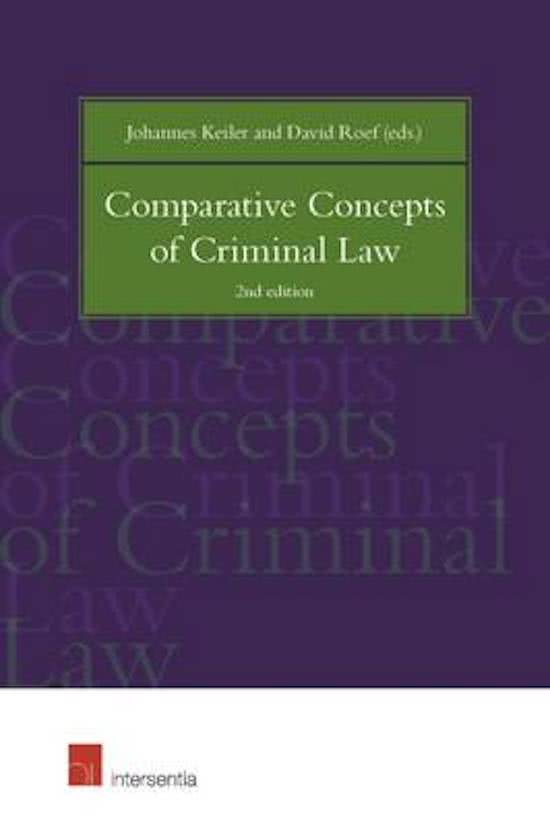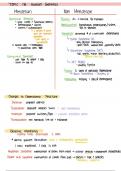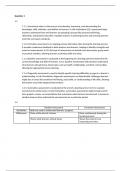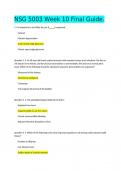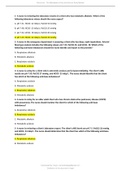Substantive Criminal Law
Week 6:
Chapter 9: Forms of Participation
The paradigmatic case in criminal law is that of a sole perpetrator who is both initiator and
executioner of his criminal plans. However, there are different degrees of involvement
conceivable in a criminal endeavour and one of the difficult tasks, which every penal systems
faces, is to determine the proper scope of liability for participation in a criminal offence.
Terminology:
- Perpetrator/principal: Person whose liability is primary. It can be established
independently of all other parties involved in the commission of the offence. His
liability is direct and not derived from someone else’s wrongdoing.
- Accomplices/accessories: All those whose liability is derived from the wrongdoing of
the perpetrator. Their liability is termed secondary or accessory. Civil law: notions of
aiding and instigation. Common law: notions of aiding, abetting, counselling and
procuring.
2 approaches for categorisation of participatory conduct:
- Neat categorisation of participatory conduct into different modes, carrying varying
degrees of punishment. Hold each participant liable for his contribution.
- It is also possible to consider everyone participating in the criminal endeavour to have
committed the offence and leave the precise meting out of punishment to the
discretion of the courts.
- Some penal systems recognise an obligatory mitigation of punishment for
accessories (Germany and NL) and some systems that favour the equivalence theory
do not officially impose a mitigated punishment for lesser forms of participation
(England).
Derivative nature of complicity:
- Accessorial liability is commonly perceived as a category of ‘derivative liability’.
Complicity is not a crime in itself, no one can be charged with it.
- Fletcher: The accomplice’s liability must derive from something. Defences that are
personal to the perpetrator himself (excuses like insanity) do not sever the derivative
link, while defences of general application (justifications like self-defence) break the
derivative link.
- 2nd problem: Should accomplices still be held liable even if there has not (yet) been a
criminal offence?
- 3rd problem: The derivative nature of complicity can lead to some other interesting
lacunas in the law. How can we hold a participant criminally liable if he used another
person who is not criminally liable as a tool to commit the actus reus of the offence?
Mens rea and deviations from the original plan:
- What happens if one participant (perpetrator or accomplice), by mistake or
deliberately, commits a crime that does not exactly correspond to the original plan?
- Problem may first arise where the actual perpetrator commits another offence than
originally intended by the instigator.
- Joint criminal enterprise: The simplest form is when several participants made a
common plan to commit an offence, go ahead and commit that offence, but one
participant commits a separate offence which goes beyond the original plan.
Week 6:
Chapter 9: Forms of Participation
The paradigmatic case in criminal law is that of a sole perpetrator who is both initiator and
executioner of his criminal plans. However, there are different degrees of involvement
conceivable in a criminal endeavour and one of the difficult tasks, which every penal systems
faces, is to determine the proper scope of liability for participation in a criminal offence.
Terminology:
- Perpetrator/principal: Person whose liability is primary. It can be established
independently of all other parties involved in the commission of the offence. His
liability is direct and not derived from someone else’s wrongdoing.
- Accomplices/accessories: All those whose liability is derived from the wrongdoing of
the perpetrator. Their liability is termed secondary or accessory. Civil law: notions of
aiding and instigation. Common law: notions of aiding, abetting, counselling and
procuring.
2 approaches for categorisation of participatory conduct:
- Neat categorisation of participatory conduct into different modes, carrying varying
degrees of punishment. Hold each participant liable for his contribution.
- It is also possible to consider everyone participating in the criminal endeavour to have
committed the offence and leave the precise meting out of punishment to the
discretion of the courts.
- Some penal systems recognise an obligatory mitigation of punishment for
accessories (Germany and NL) and some systems that favour the equivalence theory
do not officially impose a mitigated punishment for lesser forms of participation
(England).
Derivative nature of complicity:
- Accessorial liability is commonly perceived as a category of ‘derivative liability’.
Complicity is not a crime in itself, no one can be charged with it.
- Fletcher: The accomplice’s liability must derive from something. Defences that are
personal to the perpetrator himself (excuses like insanity) do not sever the derivative
link, while defences of general application (justifications like self-defence) break the
derivative link.
- 2nd problem: Should accomplices still be held liable even if there has not (yet) been a
criminal offence?
- 3rd problem: The derivative nature of complicity can lead to some other interesting
lacunas in the law. How can we hold a participant criminally liable if he used another
person who is not criminally liable as a tool to commit the actus reus of the offence?
Mens rea and deviations from the original plan:
- What happens if one participant (perpetrator or accomplice), by mistake or
deliberately, commits a crime that does not exactly correspond to the original plan?
- Problem may first arise where the actual perpetrator commits another offence than
originally intended by the instigator.
- Joint criminal enterprise: The simplest form is when several participants made a
common plan to commit an offence, go ahead and commit that offence, but one
participant commits a separate offence which goes beyond the original plan.

